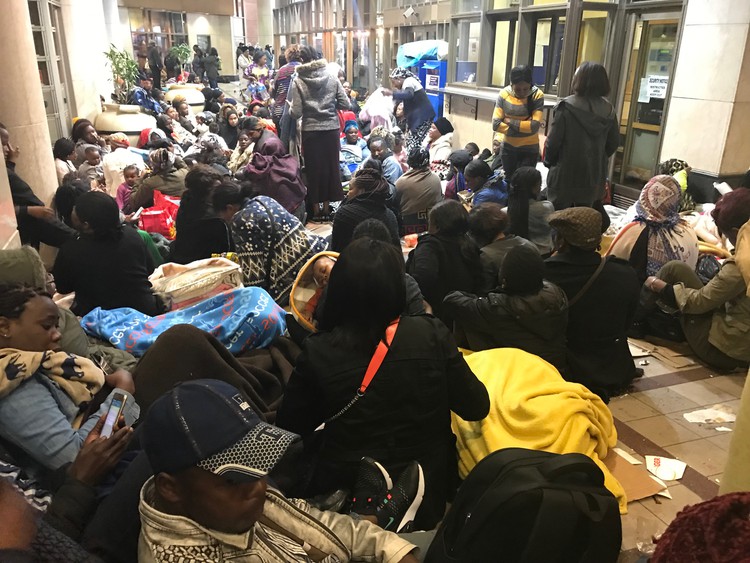
Protesters Camp Outside UN HCR Offices in Cape Town, South Africa
Refugees sitting outside the offices of the United Nations High Commission for Refugees (UNHCR) in Cape Town say they have been victims of xenophobia in South Africa and the UNHCR should help them settle elsewhere. Carine Kavira, who says her brother was shot dead in a 2012 xenophobic attack, says she won’t leave the UNHCR […]

Refugees sitting outside the offices of the United Nations High Commission for Refugees (UNHCR) in Cape Town say they have been victims of xenophobia in South Africa and the UNHCR should help them settle elsewhere.

Carine Kavira, who says her brother was shot dead in a 2012 xenophobic attack, says she won’t leave the UNHCR offices until she finds a solution to her problems. She slept outside with her two children and sister on Tuesday night after a protest outside the offices.
The group of hundreds of refugees who protested have vowed to continue the protests until the UNHCR changes its treatment of them. They have accused the organisation of failing to protect them from xenophobia, failing to help get their documents from Home Affairs and failing to help them with resettlement in other countries.
“I am not leaving without an answer,” said Kavira, who is from the Democratic Republic of Congo. “I have seen horror in my country. I am not scared.”
“South Africans have made it clear that they do not want us in their country. They say we are taking their jobs, our brothers are taking their women. So UNHCR should look for other countries that have compassion for refugees. UNHCR should facilitate that we leave,” she said.
Kavira said she came to South Africa in 2003 after her parents were killed in the Eastern province of DRC but she is still using an asylum document. Despite being a qualified chef from South African Chefs Academy she earns less than R4,000 per month.
Her 12-year-old daughter Wendy Diatezua said, “I have been missing school since yesterday because I don’t want to be in a country where I am attacked, beaten up and reminded every minute that I do not belong here. I was slapped on the face and threatened with a knife by other school children while I waited for a train at Salt River.”
“UNHCR should assist my family to leave.”
Patrick Mbangu has no documents but his wife has refugee status. In 2008 he obtained refugee status under a single family file. But in 2014, Home Affairs took him and the couple’s four children out of the file, and said he and the children should leave. He has a security company and says one of his employees was shot in front of the offices in Maitland on 16 September in the recent xenophobic attacks. “I do not understand why a black brother would hate his black brother to such extent. We do not want to stay here anymore … UNHCR must take action.”
Cuma Aamani also said he experienced a xenophobic attack at his work place. He was hospitalised for six months after colleagues from the security company he was working for in Strand assaulted him with golf clubs. “I don’t feel safe, I am prepared to camp here even for months till I get an answer.”
One of the organisers of the protest, Jean-Pierre Balous from Western Cape Leadership for Refugees, Migrants and Women, said UNHCR employees were using a back door to enter and exit the office. He said an employee who addressed the protesters yesterday said UNHCR supported integration, not resettlement. “But how are they going to do it when communities don’t want refugees anymore? Forcing them is what is escalating these xenophobic attacks.”
“UNHCR outside has done a tremendous job but in this country they are distancing themselves from the mandate of UNHCR. They treat refugees badly. Refugees are being threatened in the communities they live. If they do not leave South Africa they will be killed. Other countries have already repatriated their citizens but a refugee does not have a home to go back to. We will sit at the UNHCR until we receive a proper answer.”
Groundup contacted UNHCR head office by email and phone on Tuesday but did not receive an answer. On Wednesday on the phone, Markku Aikomus, spokesperson for UNHCR Southern Africa, said the organisation would issue a statement in the afternoon. UNHCR comment will be added when it is received.
